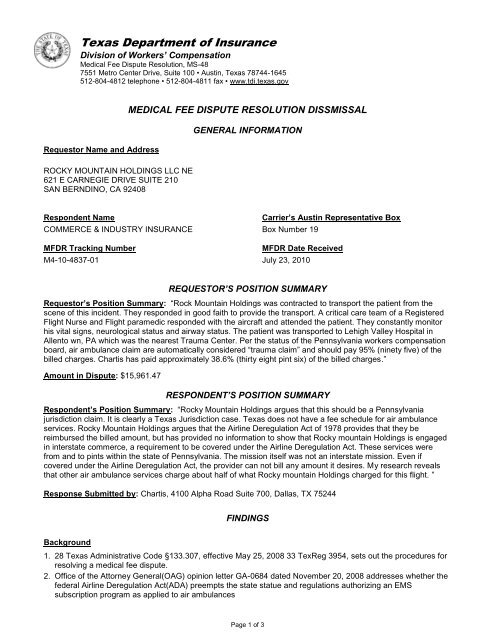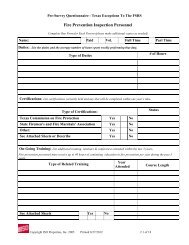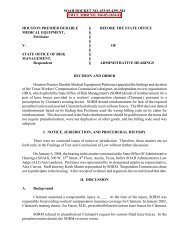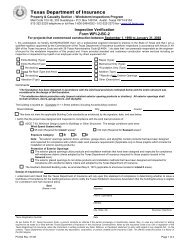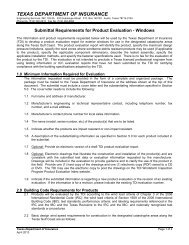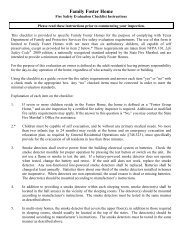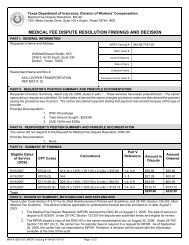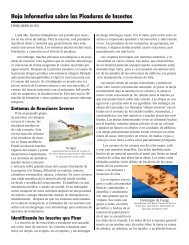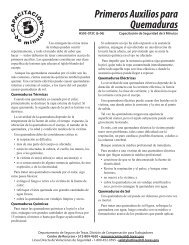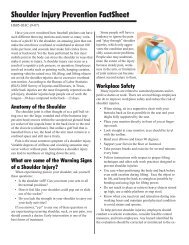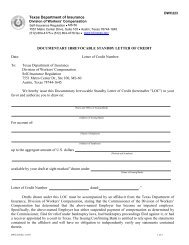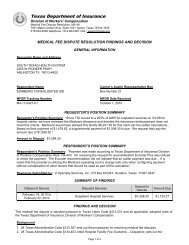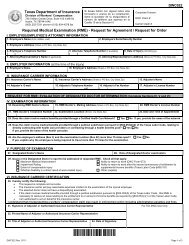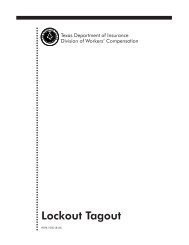Division of Workers' Compensation Letter - Texas Department of ...
Division of Workers' Compensation Letter - Texas Department of ...
Division of Workers' Compensation Letter - Texas Department of ...
You also want an ePaper? Increase the reach of your titles
YUMPU automatically turns print PDFs into web optimized ePapers that Google loves.
<strong>Texas</strong> <strong>Department</strong> <strong>of</strong> Insurance<br />
<strong>Division</strong> <strong>of</strong> Workers’ <strong>Compensation</strong><br />
Medical Fee Dispute Resolution, MS-48<br />
7551 Metro Center Drive, Suite 100 • Austin, <strong>Texas</strong> 78744-1645<br />
512-804-4812 telephone • 512-804-4811 fax • www.tdi.texas.gov<br />
Requestor Name and Address<br />
MEDICAL FEE DISPUTE RESOLUTION DISSMISSAL<br />
GENERAL INFORMATION<br />
ROCKY MOUNTAIN HOLDINGS LLC NE<br />
621 E CARNEGIE DRIVE SUITE 210<br />
SAN BERNDINO, CA 92408<br />
Respondent Name<br />
COMMERCE & INDUSTRY INSURANCE<br />
MFDR Tracking Number<br />
M4-10-4837-01<br />
Carrier’s Austin Representative Box<br />
Box Number 19<br />
MFDR Date Received<br />
July 23, 2010<br />
REQUESTOR’S POSITION SUMMARY<br />
Requestor’s Position Summary: “Rock Mountain Holdings was contracted to transport the patient from the<br />
scene <strong>of</strong> this incident. They responded in good faith to provide the transport. A critical care team <strong>of</strong> a Registered<br />
Flight Nurse and Flight paramedic responded with the aircraft and attended the patient. They constantly monitor<br />
his vital signs, neurological status and airway status. The patient was transported to Lehigh Valley Hospital in<br />
Allento wn, PA which was the nearest Trauma Center. Per the status <strong>of</strong> the Pennsylvania workers compensation<br />
board, air ambulance claim are automatically considered “trauma claim” and should pay 95% (ninety five) <strong>of</strong> the<br />
billed charges. Chartis has paid approximately 38.6% (thirty eight pint six) <strong>of</strong> the billed charges.”<br />
Amount in Dispute: $15,961.47<br />
RESPONDENT’S POSITION SUMMARY<br />
Respondent’s Position Summary: “Rocky Mountain Holdings argues that this should be a Pennsylvania<br />
jurisdiction claim. It is clearly a <strong>Texas</strong> Jurisdiction case. <strong>Texas</strong> does not have a fee schedule for air ambulance<br />
services. Rocky Mountain Holdings argues that the Airline Deregulation Act <strong>of</strong> 1978 provides that they be<br />
reimbursed the billed amount, but has provided no information to show that Rocky mountain Holdings is engaged<br />
in interstate commerce, a requirement to be covered under the Airline Deregulation Act. These services were<br />
from and to pints within the state <strong>of</strong> Pennsylvania. The mission itself was not an interstate mission. Even if<br />
covered under the Airline Deregulation Act, the provider can not bill any amount it desires. My research reveals<br />
that other air ambulance services charge about half <strong>of</strong> what Rocky mountain Holdings charged for this flight. ”<br />
Response Submitted by: Chartis, 4100 Alpha Road Suite 700, Dallas, TX 75244<br />
FINDINGS<br />
Background<br />
1. 28 <strong>Texas</strong> Administrative Code §133.307, effective May 25, 2008 33 TexReg 3954, sets out the procedures for<br />
resolving a medical fee dispute.<br />
2. Office <strong>of</strong> the Attorney General(OAG) opinion letter GA-0684 dated November 20, 2008 addresses whether the<br />
federal Airline Deregulation Act(ADA) preempts the state statue and regulations authorizing an EMS<br />
subscription program as applied to air ambulances<br />
Page 1 <strong>of</strong> 3
Issues<br />
1. Is the requestor an interstate air ambulance carrier?<br />
2. Does the Federal Aviation Act, in particular the Airline Deregulation Act <strong>of</strong> 1978 section 41713 <strong>of</strong> Title 49<br />
U.S.C.A., preempt the state statutes concerning air ambulance services?<br />
3. Does the <strong>Division</strong> <strong>of</strong> Workers’ <strong>Compensation</strong> have jurisdiction over disputes involving interstate air ambulance<br />
services?<br />
Findings<br />
1. The requestor billed ambulance codes A0431 defined as “Ambulance service, conventional air services,<br />
transport, one way (rotary wing)” and A0436 defined as “Rotary wing air mileage, per statute mile” for air<br />
ambulance service from Wyalusing, PA to Lehigh Valley Hospital (Cedar Crest) in Allentown, PA. The<br />
requestor, Rocky Mountain Holdings, LLC NE, submitted Air Carrier Certificate number OMLA253U which<br />
certifies that Air Methods Corporation has “met the requirements <strong>of</strong> the Federal Aviation Act <strong>of</strong> 1958….and is<br />
hereby authorized to operate as an air carrier in accordance with said Act…..”. This supports the requestor as<br />
an interstate carrier providing intrastate services.<br />
2. 49 USC Section 41713(b)(1) states that "... a State, political subdivision <strong>of</strong> a State, or political authority <strong>of</strong> at<br />
least 2 States may not enact or enforce a law, regulation, or other provision having the force and effect <strong>of</strong> law<br />
related to a price, route, or service <strong>of</strong> an air carrier that may provide air transportation under this subpart." In<br />
opinion number GA-0684, dated November 20, 2008, the <strong>Texas</strong> Attorney General concluded that 49 USC<br />
Section 41713 preempted certain provisions <strong>of</strong> the <strong>Texas</strong> Health and Safety Code and <strong>Texas</strong> Administrative<br />
Code "to the extent these provisions relate to rates charged by air carriers providing air ambulance services."<br />
The United States Supreme Court has held that: “To ensure that the states could not undo federal deregulation<br />
with regulation <strong>of</strong> their own, the ADA (Airline Deregulation Act <strong>of</strong> 1978) included a preemption provision,<br />
prohibiting the States from enforcing any law ‘relating to rates, routes or services <strong>of</strong> any air carrier’.” Morales v.<br />
Tran World Airlines, Inc., 504 U.S. 374, 112 S. Ct 2031 (1992). Accordingly, the <strong>Division</strong> finds that 49 USC<br />
Section 41713 preempts provisions <strong>of</strong> the <strong>Texas</strong> Labor Code and Title 28 <strong>Texas</strong> Administrative Code Chapter<br />
134.203(d) relating to the price <strong>of</strong> air transportation furnished to an injured worker by an interstate air carrier<br />
under that federal law.<br />
3. Per 28 <strong>Texas</strong> Administrative Code §133.307(a)(3), "...the role <strong>of</strong> the <strong>Division</strong> <strong>of</strong> <strong>Workers'</strong> <strong>Compensation</strong><br />
(<strong>Division</strong>) is to adjudicate the payment, given the relevant statutory provisions and <strong>Division</strong> rules." Ins<strong>of</strong>ar as<br />
adjudicating the fees for the disputed services would involve enforcing a law, regulation, or other provision<br />
related to the price <strong>of</strong> air transportation provided by an interstate carrier, the <strong>Division</strong> finds that this dispute is<br />
not under the jurisdiction <strong>of</strong> the <strong>Division</strong> <strong>of</strong> <strong>Workers'</strong> <strong>Compensation</strong> and is therefore not eligible for medical fee<br />
dispute resolution under §133.307.<br />
Conclusion<br />
The <strong>Division</strong> concludes that it does not have jurisdiction over disputes involving fees for interstate air ambulance<br />
carriers. The dispute is hereby dismissed for good cause pursuant to 28 <strong>Texas</strong> Administrative Code §133.307(e)<br />
(3)(J).<br />
DISMISSAL<br />
The <strong>Division</strong> has determined that it does not have jurisdiction over this dispute. The request for medical fee<br />
dispute resolution is hereby dismissed.<br />
Authorized Signature<br />
Signature<br />
Medical Fee Dispute Resolution Officer<br />
7/26/12<br />
Date<br />
Page 2 <strong>of</strong> 3
YOUR RIGHT TO REQUEST AN APPEAL<br />
Either party to this medical fee dispute may appeal this decision by requesting a contested case hearing. <strong>Texas</strong><br />
Administrative Code §133.307(f) states:” A party to a medical fee dispute may seek review <strong>of</strong> the MDR decision or<br />
dismissal [emphasis added].” A completed Request for a Medical Contested Case Hearing (form DWC045A)<br />
must be received by the DWC Chief Clerk <strong>of</strong> Proceedings within twenty days <strong>of</strong> your receipt <strong>of</strong> this decision. A<br />
request for hearing should be sent to: Chief Clerk <strong>of</strong> Proceedings, <strong>Texas</strong> <strong>Department</strong> <strong>of</strong> Insurance, <strong>Division</strong> <strong>of</strong><br />
Workers <strong>Compensation</strong>, P.O. Box 17787, Austin, <strong>Texas</strong>, 78744. The party seeking review <strong>of</strong> the MDR decision<br />
shall deliver a copy <strong>of</strong> the request for a hearing to all other parties involved in the dispute at the same time the<br />
request is filed with the <strong>Division</strong>. Please include a copy <strong>of</strong> the Medical Fee Dispute Resolution Findings and<br />
Decision together with any other required information specified in 28 <strong>Texas</strong> Administrative Code §148.3(c),<br />
including a certificate <strong>of</strong> service demonstrating that the request has been sent to the other party.<br />
Si prefiere hablar con una persona en español acerca de ésta correspondencia, favor de llamar a 512-804-4812.<br />
Page 3 <strong>of</strong> 3


